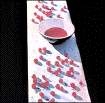
|
||||||||||||||||||||||||||||||||||||||||||||||||||||||
|
I had a lovely time at the Public Media conference last week.
To say we, the bloggers, were well-received, would be an understatement. We were treated like stars and gurus, our words listened to attentively, our ideas received enthusiastically. What a joy and what a contrast to the tech industry, where bloggers are mostly seen as a business model, not a source of ideas. Anyway, the post-conference emails are just beginning to be responded to, and I expect lots of good stuff to come from this first visit. There's talk of doing a BloggerCon for public radio. I'm helping the NewsHour people make their podcast feeds a little more useful. Most important I want to work on a vital exchange of ideas and perspectives across the pro-amateur boundary. I want them to teach us how to produce content up to their standards, so bloggers, podcasters and vloggers who want their work to air on NPR and PBS will know what they're looking for. And I want our methods to gain adoption in their space. An example is the way the Scripting News community researched the problem with audio on MacBooks yesterday. This open research method can be applied equally well for public media. You just have to let us know what you're interested in. I promised to help them boot up a research blog, following this model. To my new friends at NPR and PBS -- ignore the naysayers -- Andrew Keen and Lowell Bergman can believe what they want, but we want to make the world better, and we feel good about what we're doing, and if they don't like it, too bad! Paul Andrews, formerly of the Seattle Times, continues. I wonder if, with the benefit of hindsight, the music industry wishes it had done something different with Napster. Shutting it down might have felt good at the time, but did it cure the problem? Might there not have been a way to make hay out of the lemonade? In other words, could the music industry have struck a new deal with its users, a win-win so we get what we want, and they maintain their cash flow. An example of a new deal -- tolerate the sharing low-rez scans of the music. Set a bit-rate that's semi-legal, and enforce, with Napster, the rule that anything scanned at a higher rate will immediately be removed, unless it can be shown that the artists permit redistribution of high scan-rate versions. I think even the indies would have gone for this, especially at the time. The users would have had to realize that this is fair. We would get to share the ideas and feelings of the music, freely, which I think is what we want (it's what I want) but reserve for the commercial interests the best listening experiences. The reason this is on-topic right now is because the same battle is playing out now in video, with YouTube. Two recent events caught my eye: 1. Viacom requests that all its content be pulled off YouTube, and then does a deal with Joost for distributing that content. 2. The Oscars ask YouTube to pull down clips from Sunday's show.
It seems the entertainment industry doesn't recognize the power of its users. They're accustomed to dealing with artists and other companies, esp really large ones, but they haven't learned how to negotiate with the users, and that's who they have to deal with, if they want a future. Update #1: Mark Cuban suggests a different negotiation with the user: Post a short verison of the video on YouTube, with the full version on the Oscars site, linked to by the video on YouTube. Not bad, but I like the lo-rez vs hi-rez approach better, as a user (which is what I am). SF Chronicle: "The RIAA has sued thousands of college students since 2003." I'm trying an experiment with Scripting News. Now every item has a title, and I'm doing longer items, and leaving the linkblogging out. That doesn't mean I don't see pieces on other sites that I want to come back to (that's often why I link to something here), but I just haven't yet found a way to make that fit into the new regime.
To kick it off, an interesting idea from CalacanisLand. Calacanis: "Someone should make the Starbucks of office space." With little more Google juice I might just own Suze Orman. (However, I'm not sure what I'd do if I did.) Also I still have a nice chunk of John Doerr. For ten points, guess who is the "senior administration official" in this press release from the Office of the Vice-President of the United States. Hint: He is one heartbeat from being president. This note is of interest to people in the OPML community taking advantage of the free directory hosting feature called Map A Domain. A few months ago we changed the address of the server to 67.18.151.44, but we still supported sites that were mapped to the old domain. I'm finally at a point where I can shut off the old server completely, and I'll do that by the end of March. If you have a directory hosted with this service, please map that domain to the new address, 67.18.151.44, asap, so that readers will be able to find your directories. Here's a list of domains that must be remapped to point to 67.18.151.44: |
Dave Winer, 51, pioneered the development of weblogs, syndication (RSS), podcasting, outlining, and web content management software; former contributing editor at Wired Magazine, research fellow at Harvard Law School, entrepreneur, and investor in web media companies. A native New Yorker, he received a Master's in Computer Science from the University of Wisconsin, a Bachelor's in Mathematics from Tulane University and currently lives in Berkeley, California. "The protoblogger." - NY Times.
"Helped popularize blogging, podcasting and RSS." - Time.
"RSS was born in 1997 out of the confluence of Dave Winer's 'Really Simple Syndication' technology, used to push out blog updates, and Netscape's 'Rich Site Summary', which allowed users to create custom Netscape home pages with regularly updated data flows." - Tim O'Reilly.
Comment on today's
|
|||||||||||||||||||||||||||||||||||||||||||||||||||||
|
© Copyright 1997-2007 Dave Winer. Previous/Next |
||||||||||||||||||||||||||||||||||||||||||||||||||||||
 It had the feel of a user conference, which are really the kinds of conferences I like. And unlike the entertainment industry conferences I'd been to, these people are not so commercial and not bullies. Later, I was told that the people who come to this conference are the people most like bloggers in public media, but I also met a few execs, including the COO and a couple of board members of NPR, and they were excited too.
It had the feel of a user conference, which are really the kinds of conferences I like. And unlike the entertainment industry conferences I'd been to, these people are not so commercial and not bullies. Later, I was told that the people who come to this conference are the people most like bloggers in public media, but I also met a few execs, including the COO and a couple of board members of NPR, and they were excited too. 



